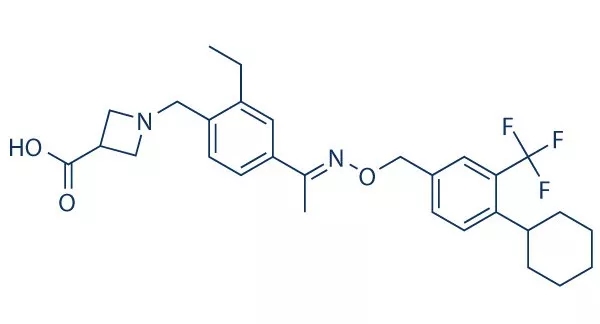Significantly improved disability, Novartis intends to submit a new drug application for multiple sclerosis
March 26, 2018 Source: WuXi PharmaTech
Window._bd_share_config={ "common":{ "bdSnsKey":{ },"bdText":"","bdMini":"2","bdMiniList":false,"bdPic":"","bdStyle":" 0","bdSize":"16"},"share":{ }};with(document)0[(getElementsByTagName('head')[0]||body).appendChild(createElement('script')) .src='http://bdimg.share.baidu.com/static/api/js/share.js?v=89860593.js?cdnversion='+~(-new Date()/36e5)];Today, Novartis announced the full results of its three studies of EXPAND in the Lancet. The study evaluated the efficacy of a daily oral administration of the new drug siponimod (BAF312) in the treatment of secondary progressive multiple sclerosis (SPMS). These key results showed a significant reduction in the risk of disability progression at 3 months (primary endpoint) and 6 months compared with placebo, and also showed favorable results in other relevant measures of MS disease activity. If approved, siponimod will be the first disease remission therapy to delay the progression of disability in typical SPMS patients, including many patients who have achieved non-recurrent and high disability.

Multiple sclerosis (MS) is a chronic disease of the central nervous system (CNS) that destroys the normal function of the brain, optic nerve, and spinal cord through inflammation and tissue loss. Advances in MS can lead to increased loss of physical (eg, walking) and cognitive (eg, memory) functions. There are three main types of MS: relapsing-remitting MS (RRMS), secondary progressive MS (SPMS), and primary progressive MS (PPMS). Among them, SPMS leads to a progressive and irreversible disability, which is largely unrelated to recurrence and can seriously affect a patient's ability to perform daily activities. Patients typically transition from the initial phase of RRMS to SPMS, and approximately one in four RRMS patients eventually undergo SPMS within 10 years of the initial diagnosis and will rise to three-quarters after 30 years. These patients urgently need effective and safe treatments to delay the progression of disability in SPMS.

â–²Siponimod's molecular structure (Source: Selleck)
Siponimod is such a potential new drug. It is an oral selective modulator of sphingosine-1-phosphate (S1P) receptor subtypes 1 and 5 (S1P1 and S1P5) that binds to the S1P1 subreceptor on lymphocytes and prevents entry. The CNS of MS patients has an anti-inflammatory effect. In addition, siponimod also enters the CNS and binds to the S1P5 sub-receptors (oligodendrocytes and astrocytes) and has the potential to regulate the activity of destructive cells, helping to reduce neurological loss associated with SPMS. The receptor specificity and pharmacokinetic properties of Siponimod (such as faster elimination than the first generation of S1P modulators) can promote the onset of treatment while increasing its safety and convenience.
The published EXPAND study was a randomized, double-blind, placebo-controlled phase 3 clinical trial comparing the efficacy and safety of siponimod versus placebo in patients with SPMS. This is the largest randomized controlled trial to date in SPMS patients, including 1651 SPMS patients from 31 countries. In the study, patients were randomized to receive a daily siponimod 2 mg or placebo in a 2:1 ratio, and patients continued siponidomod in the long-term extension of the open label.
Complete data from EXPAND showed that siponimod significantly reduced the risk of disability progression by 21% compared with placebo (p=0.013; primary endpoint); efficacy was consistent across many pre-defined subgroups. Other clinically relevant endpoint data showed that compared to placebo, siponimod:
• Reduced the risk of disability progression by 26% for 6 months (p=0.0058)
• Reduce brain volume loss by 23% (relative difference; average of 12 and 24 months, p=0.0002)
• Limit the volume of T2 lesions by approximately 80% (average of 12 and 24 months, p<0.0001)
• Reduced annual recurrence rate (ARR) by 55% (p<0.0001)
• No significant differences in the timing 25 foot walk test and the MS walking scale
• Prove that the safety profile is consistent with the known effects of S1P receptor regulation
"The complete EXPAND results released today show that siponimod can delay the progression of disability in typical SPMS patients, and other methods tested so far have not been successful," said Professor Ludwig Kappos, professor at Basel University Hospital and principal researcher at EXPAND: "Consider most The patient already had a senior disability at the start of EXPAND, and the data is even more impressive."
“Nova is committed to advancing MS research and developing solutions for SPMS patients with this complex and debilitating disease,†said Dr. Danny Bar-Zohar, Global Head of Neuroscience Development at Novartis. “Key EXPAND data for patients and The medical community has hoped that a much-needed, safe and effective treatment plan for SPMS is about to emerge, and treatment options in this area are scarce. We look forward to continuing to work with regulators to bring siponimod to these patients as quickly as possible."
Novartis plans to submit a regulatory application for siponimod to the US FDA in early 2018, and has initiated scientific consultations with the European Medicines Agency (EMA) and plans to submit applications in the third quarter of 2018.
We wish this new drug a smooth road to market and bring disease relief to SPMS patients suffering from disability as soon as possible.
Reference materials:
[1] Phase III data in The Lancet show Novartis siponimod significant improves outcomes in patients with secondary progressive MS
[2] Novartis Published Multiple Sclerosis Trial Data With Plans to File for FDA Approval
Plastic Hinges,Plastic Door Hinges,Small Cabinet Hinges,Plastic Cabinet Hinges
Ningbo Hengchieh Locking Technology Co., Ltd. , https://www.yh-lock.com